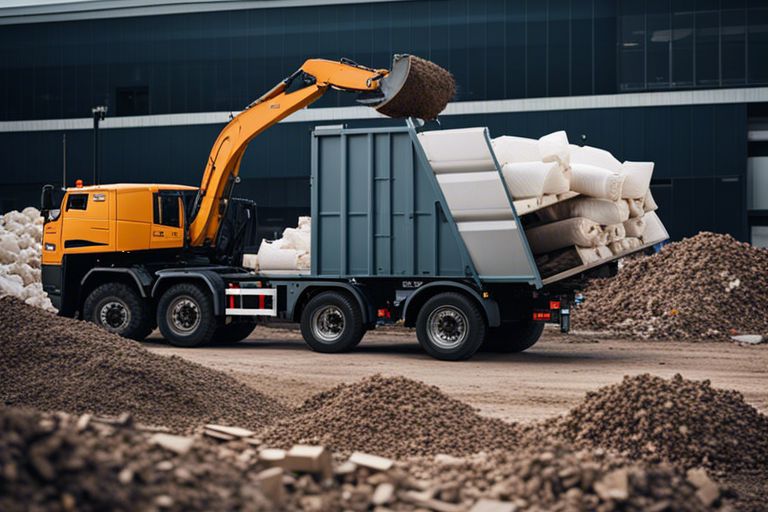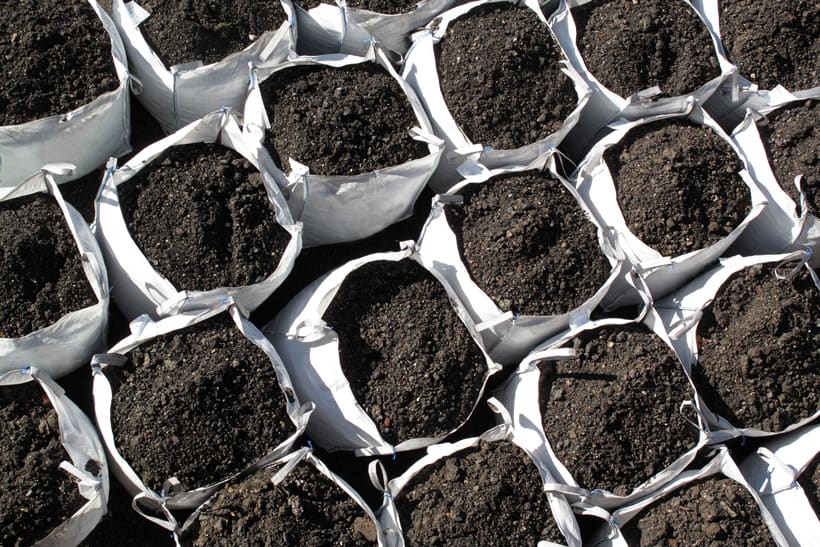In modern society, the proliferation of waste has intricately woven itself into the fabric of our daily lives, often eluding our conscious efforts to contain it. The burgeoning problem of waste in UK landfills poses a significant threat to the environment, public health, and future generations. Understanding the grave impact of waste on our landfills is essential in order to take proactive measures to mitigate its effects. This how-to style blog post will explore the detrimental effects of excessive waste on UK landfills and provide practical and effective strategies to minimise and manage waste in a sustainable manner. By implementing these strategies, we can collectively work towards reducing the strain on our landfills and paving the way for a more environmentally-friendly future.
Key Takeaways:
- Effect on Environment: Excessive waste in UK landfills is causing harmful environmental impact, including pollution and depletion of natural resources.
- Importance of Recycling: Minimising waste can be achieved through rigorous recycling efforts, making use of sustainable materials and reducing single-use plastics.
- Government Intervention: The UK government is taking steps to regulate landfill waste and promote alternative waste management solutions such as incineration and waste-to-energy technology.
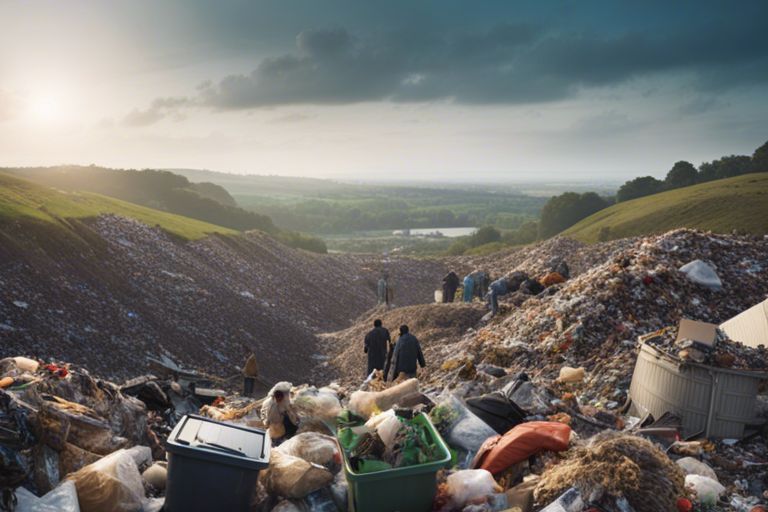
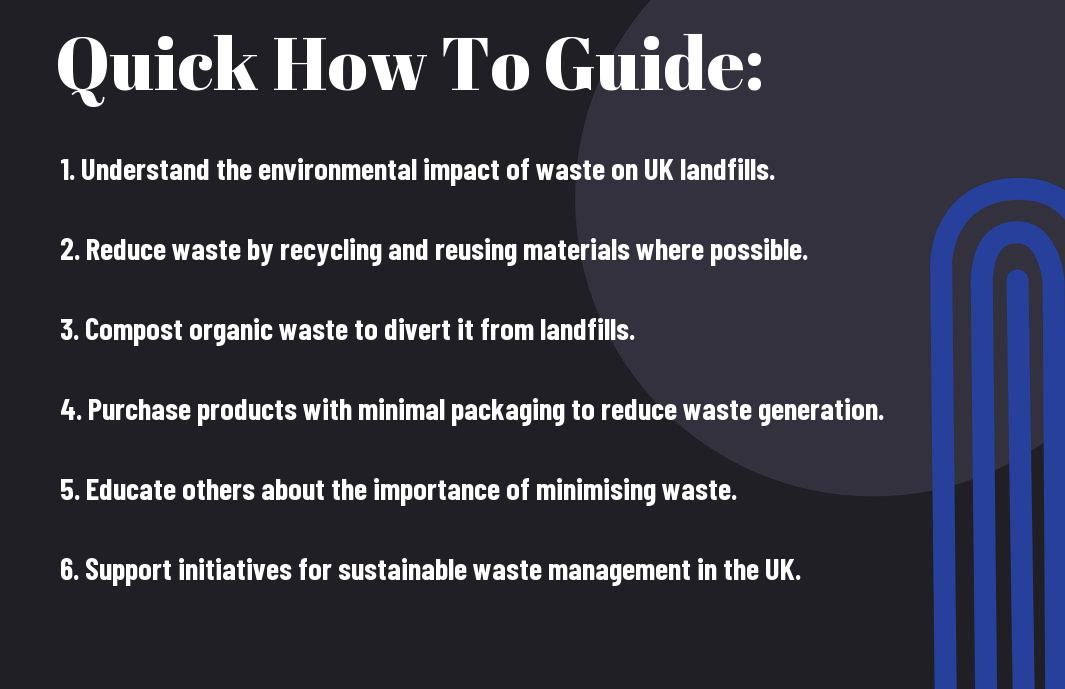
Factors Contributing to Landfill Growth
Landfill growth in the UK is heavily influenced by a number of factors, largely stemming from consumer and industrial waste practices, and the regulatory frameworks in place to manage these. Understanding these factors is crucial in addressing the issue and working towards minimising the impact of waste on UK landfills.
- Consumer Behaviour and Disposable Culture
- Industrial and Commercial Waste Practices
- Regulatory Frameworks and Their Enforcement
Consumer Behaviour and Disposable Culture
The consumer behaviour and disposable culture in the UK has significantly contributed to the growth of landfills. The rise of single-use plastics, excessive packaging, and increased consumption of disposable items has led to a surge in household waste production. This shift in consumer mindset towards convenience and disposability has exacerbated the landfill problem, as the majority of these items are not easily biodegradable and end up in landfills.
Moreover, the lack of proper waste segregation and recycling practices among consumers has further intensified the issue. Though recycling initiatives have been implemented, there remains a need for a shift in consumer mindset towards sustainable and eco-friendly choices to reduce the impact on landfills.
Industrial and Commercial Waste Practices
Industrial and commercial activities have also played a significant role in landfill growth. Mass production, packaging, and distribution processes generate a substantial amount of non-biodegradable waste, contributing to the landfills. Additionally, improper waste management practices in industrial and commercial sectors, such as inadequate recycling facilities and lack of waste reduction strategies, have further burdened landfills with excessive waste.
It is imperative to address these industrial and commercial waste practices to initiate sustainable waste management techniques. The implementation of efficient recycling methods and re-evaluation of packaging and production processes can potentially mitigate the impact of waste on landfills, translating into a positive environmental impact. This necessitates a collaborative effort from businesses, policymakers, and the public to drive substantial change in waste practices.
The adoption of sustainable waste management practices within industrial and commercial sectors, such as waste-to-energy technologies and waste minimisation strategies, is critical in reducing the burden on landfills. Furthermore, incentivising businesses to adopt environmentally friendly practices and imposing stringent regulations can contribute to significant improvement in waste management, ultimately alleviating the pressure on landfills.
Regulatory Frameworks and Their Enforcement
The establishment of regulatory frameworks to govern waste management is essential in combating landfill growth. However, the effectiveness of these frameworks heavily depends on their enforcement. Stringent waste disposal regulations and compliance monitoring are instrumental in curbing illegal dumping and promoting responsible waste management practices.
Though there are several regulations in place, the enforcement of these laws needs to be rigorously monitored and reinforced to deter non-compliance. Additionally, the implementation of sustainable waste management policies and the promotion of responsible waste disposal practices through regulatory frameworks are central to mitigating the impact of waste on UK landfills.
How to Strategize Waste Reduction
Minimising waste generation and promoting responsible waste management is crucial in reducing the impact of waste on UK landfills. By implementing effective waste reduction strategies, individuals and businesses can significantly contribute to the conservation of natural resources and the environment.
Incorporating the 3 Rs: Reduce, Reuse, Recycle
One of the most effective approaches to waste reduction is to incorporate the principles of the 3 Rs: Reduce, Reuse, and Recycle. Firstly, by reducing the consumption of single-use products and packaging, individuals can significantly minimise the amount of waste generated. Secondly, reusing items whenever possible can help extend their lifespan and reduce the need for new products. Finally, recycling waste materials, such as paper, glass, and plastic, can divert them from ending up in landfills and instead repurpose them for new products.
Advancements in Waste Treatment Technologies
With the rapid advancements in waste treatment technologies, there are now more efficient and environmentally-friendly methods available for managing different types of waste. From biological treatment systems to advanced recycling processes, these technologies offer innovative solutions for diverting waste from landfills and reducing their environmental impact.
Furthermore, the development of anaerobic digestion and energy recovery technologies has allowed for the generation of renewable energy from organic waste materials, thereby mitigating the negative effects of waste while contributing to sustainable energy production.
Tips for Individual Contribution to Waste Minimization
Reducing waste on a personal level can have a significant impact on the overall waste management in the UK. By adopting mindful consumption and making eco-friendly purchasing choices, individuals can play a crucial role in minimising waste generation.
- Opt for products with minimal packaging
- Choose reusable items over disposable ones
- Support local businesses and ethical brands
- Reduce food waste by careful meal planning and proper storage
Any efforts in reducing waste sent to landfill are valuable in the fight against environmental degradation and resource depletion.
Mindful Consumption and Eco-Friendly Purchasing
When it comes to reducing waste, being mindful about what we consume and opting for eco-friendly products is of paramount importance. Choosing products with minimal or biodegradable packaging can significantly reduce the amount of waste we send to landfills. Supporting local businesses and ethical brands that prioritise sustainable packaging solutions is a commendable step towards waste minimisation.
Composting and Organic Waste Diversion
Composting organic waste is a highly effective method for diverting a significant portion of waste from landfills. By transforming organic waste into nutrient-rich compost, individuals can contribute to reducing the amount of waste that ends up in landfills. Embracing composting at home or supporting local community composting initiatives can make a positive impact on overall waste management.
Any initiative towards composting and organic waste diversion not only reduces the burden on landfills but also nurtures the environment by producing valuable compost for soil enrichment.
Community and Policy Actions
Effective waste management requires a combination of community initiatives and government policies to minimise the impact on UK landfills. Both local community participation and government-led programs play a crucial role in addressing the growing waste problem. By working together, communities and policymakers can implement sustainable solutions to reduce the amount of waste entering landfills.
Local Community Initiatives and Participation
Local communities have the power to initiate and participate in waste reduction efforts. Through community-led recycling schemes, composting initiatives, and educational programmes, individuals can actively contribute to reducing the amount of waste that ends up in landfills. By encouraging responsible consumption and waste management practices within their own neighbourhoods, communities can collectively make a significant impact on waste reduction.
Policy Approaches and Government-Led Programs
Government policies and programmes are essential for regulating waste management and promoting sustainable practices. By implementing effective regulations, incentives, and infrastructure for waste reduction and recycling, the government can influence large-scale behaviour change. The Treatment of waste for landfill policy document provides detailed guidelines for the treatment and disposal of waste in landfills, outlining best practices for waste management.
Government-led programs such as waste reduction targets, financial incentives for recycling, and research funding for sustainable waste management technologies are essential for driving positive change. By implementing strong policies and investing in sustainable infrastructure, the government can lead the way towards a more environmentally responsible approach to waste management.
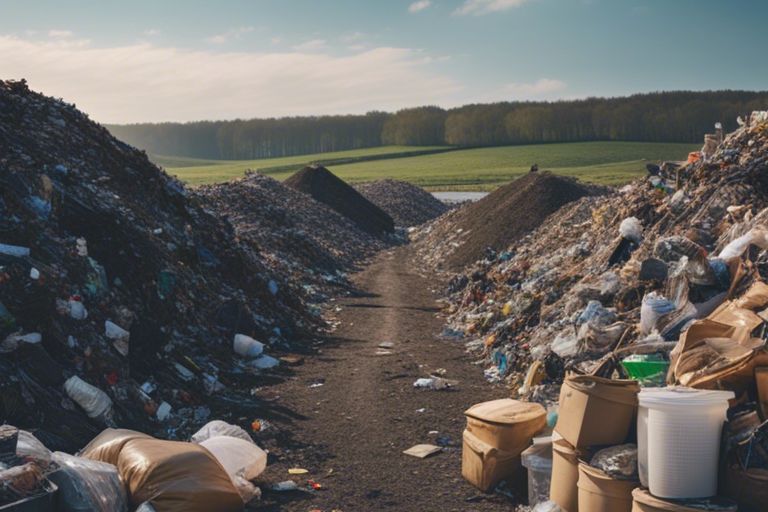
The Impact of Waste on UK Landfills and How to Minimize It
In conclusion, the impact of waste on UK landfills is significant and has far-reaching implications for the environment, public health, and resources. It is crucial for individuals, businesses, and government bodies to take action to minimise waste and implement sustainable waste management practices. This can be achieved through reducing waste generation, promoting recycling and composting, and investing in innovative waste-to-energy technologies. By working together and making conscious efforts to minimise our waste, we can alleviate the strain on UK landfills and contribute to a healthier and more sustainable future for our country. It is imperative that we take responsibility for our waste and actively seek solutions to reduce its impact on our environment and communities.
FAQ
Q: What is the impact of waste on UK landfills?
A: The impact of waste on UK landfills is significant, as it leads to the release of harmful greenhouse gases and pollutants into the atmosphere and soil, posing a threat to the environment and public health.
Q: How can we minimize the impact of waste on UK landfills?
A: The impact of waste on UK landfills can be minimized through strategies such as reducing, reusing, and recycling materials, composting organic waste, and supporting initiatives for waste-to-energy technologies.
Q: What are the long-term consequences of excessive waste accumulation in UK landfills?
A: The long-term consequences of excessive waste accumulation in UK landfills include soil contamination, depletion of natural resources, and increased risk of groundwater pollution, which can have detrimental effects on ecosystems and human well-being.
Q: How does the UK government regulate waste disposal in landfills?
A: The UK government regulates waste disposal in landfills through established waste management policies, landfill regulations, and enforcement of environmental laws to ensure proper waste treatment and disposal, as well as promoting sustainable waste management practices.
Q: What role can individuals and communities play in minimising waste impact on UK landfills?
A: Individuals and communities can play a crucial role in minimizing waste impact on UK landfills by adopting sustainable waste management practices, supporting local recycling programmes, participating in waste reduction initiatives, and promoting responsible consumption habits to reduce overall waste generation.


